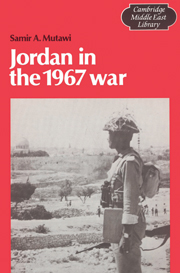Book contents
- Frontmatter
- Contents
- Preface
- Acknowledgement
- Map 1 The Hashemite Kingdom of Jordan
- Map 2 Operations on the Jordanian Front, 5–7 June 1967
- Map 3 The Campaign in Jerusalem, 5–7 June 1967
- 1 The decision-making process in Jordan
- 2 The principles and practice of Jordanian foreign policy
- 3 Friends and enemies: Jordan in inter-Arab affairs
- 4 Samu
- 5 The gathering crisis
- 6 On the brink of war
- 7 The war
- 8 The war in perspective
- 9 The aftermath
- 10 Conclusion
- Appendix Timetable for the movement of Iraqi forces to Jordan
- Biographical note
- Notes
- Bibliography
- Index
- Frontmatter
- Contents
- Preface
- Acknowledgement
- Map 1 The Hashemite Kingdom of Jordan
- Map 2 Operations on the Jordanian Front, 5–7 June 1967
- Map 3 The Campaign in Jerusalem, 5–7 June 1967
- 1 The decision-making process in Jordan
- 2 The principles and practice of Jordanian foreign policy
- 3 Friends and enemies: Jordan in inter-Arab affairs
- 4 Samu
- 5 The gathering crisis
- 6 On the brink of war
- 7 The war
- 8 The war in perspective
- 9 The aftermath
- 10 Conclusion
- Appendix Timetable for the movement of Iraqi forces to Jordan
- Biographical note
- Notes
- Bibliography
- Index
Summary
The road to Samu
In 1967 Glubb wrote that ‘ever since her repulse by the Jordan army in 1948 Israel had longed for an opportunity to overrun the remaining Arab part of Palestine, but as long as Jordan was the friend of Britain and the United States and offered her no pretext, Israel could not move’. This view of Israel was shared by Jordan's decision-makers who were convinced that Israel's leaders had never given up hope that one day the whole of historical Palestine would belong to the Jews. They recalled the fact that at the time of the Balfour Declaration in 1917 the Zionists had claimed the whole of mandatory Palestine, including present-day Jordan, as the territory on which the Jewish national home was to be established. According to Abu Odeh, ‘Jordan's exclusion from the Balfour Declaration was decided in spite of Zionist opposition to this. Hence Jordan was always conscious of Zionist strategic ambitions over its territory. Accordingly it was constantly aware of the dangers posed by Zionist progress … This historical point always remains alive in the Jordanian mind when treating the subject’.
King Hussein had no doubts about Israel's desire to expand into the West Bank. In a speech made on 25 January 1967 King Hussein declared that ‘the enemy's present objective is the West Bank; after that it will be the East Bank and after that they will expand throughout the Arab homeland to achieve their aims and ambitions’.
- Type
- Chapter
- Information
- Jordan in the 1967 War , pp. 69 - 84Publisher: Cambridge University PressPrint publication year: 1987
- 1
- Cited by

